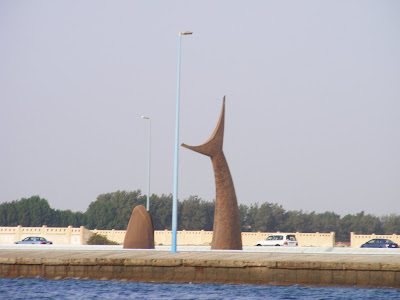
Saudi Woman wrote a post about a disturbing incident that happened a few days ago in Ha'il, a very conservative agricultural province in Saudi Arabia:
"The Commision for Prevention of Vice and Promotion of Virtue, (PVPV), has done it again. On Thursday in Ha’il, a region North West of Riyadh, a PVPV member was scouting this very conservative area for vice to prevent. He saw a woman shopping with a man and felt that her eyes (the only part of her that was showing) were too seductive and starting shouting orders at her to cover her eyes. According to her husband, he says that he heard this muttawa behind him shouting and paid him no mind until he realized that the PVPV member was addressing his wife. He turned around and told him to mind his own business. Then insults were exchanged until the PVPV member pulled out a knife and slashed the husband’s arm and stabbed him in the back, puncturing his lungs. So far, so terrible but we could at least say that this PVPV member would be rejected and held at arms length by the commission. First day the report came out, the spokesperson, sheikh Mutlaq Al Nabit claimed that they still don’t have the details of what happened except that there was an attack on the PVPV and that was followed by an altercation and the PVPV member has not admitted that he had stabbed the citizen. The next day another report came out from the same spokesperson, Shiekh Al Nabit claiming that PVPV members have every right to order women to cover their eyes if they are seductive, seditious and could push a man to sin. He also denied that the commission gave permission to the PVPV member to get into a fight and carry a weapon and claimed that all PVPV members are responsible and deserving of trust."

The more I stew about this incident, the madder I get. Women here in KSA must wear black tents when they appear in public, and their hair and necks are also covered. The only visible parts of a female allowed in public here are the face and the hands. A high percentage of Saudi women also wear a veil over their faces, and some even add black gloves. But even at that, some men here don't seem to be able to control themselves, and it is always the women's fault for that. There has even been discussion about women covering one eye and only having one eye visible because seeing two eyes peeking out from behind a black veil is too much for some men to bear - and apparently this PVPV guy is one of them. Believe me, it's hard enough navigating my way around wearing a big full length tent - you have no idea how many times I have stepped on the hem and tripped going up stairs while carrying groceries! If I had to cover one eye too, forget it!
Another thing is that in public, both men and women are supposed to lower their gazes and not look directly at a member of the opposite sex - so why was this guy looking at her in the first place? He still finds a married woman's eyes too sexy when she is minding her own business, wearing a veil and a tent, AND accompanied by her husband? This guy is really sick - and out of control!

But I tried discussing this with my husband and got even further distressed. He was of the opinion that the husband in this case should have told his wife to cover her eyes and cooperate with the outlandish order of the religious police guy. My hubby told me that if we were ever in that situation, he would tell me to cover and we would then immediately remove ourselves from the situation. He feels that he is old and feeble now since his heart surgery and doesn't want to get into any fights, no matter how unfair the situation is. Ok, I understand that, especially if you don't know that the erratic psycho has a hidden knife and is chomping at the bit to stab someone who is unarmed and innocent. But my feeling is that this would be letting this unreasonable, irrational, sex-obsessed bully win - and this would only give him the green light to continue intimidating law abiding people this way.
When in the world are Saudi men ever going to be held responsible for their actions and control themselves around women, instead of blaming and punishing women for every little nasty thought they have? And when is the PVPV going to stop making excuses for their out-of-control employees who are no more than sex-crazed thugs who like to exert and abuse whatever authority they are given? I am totally disgusted.




.jpg)

.jpg)







































